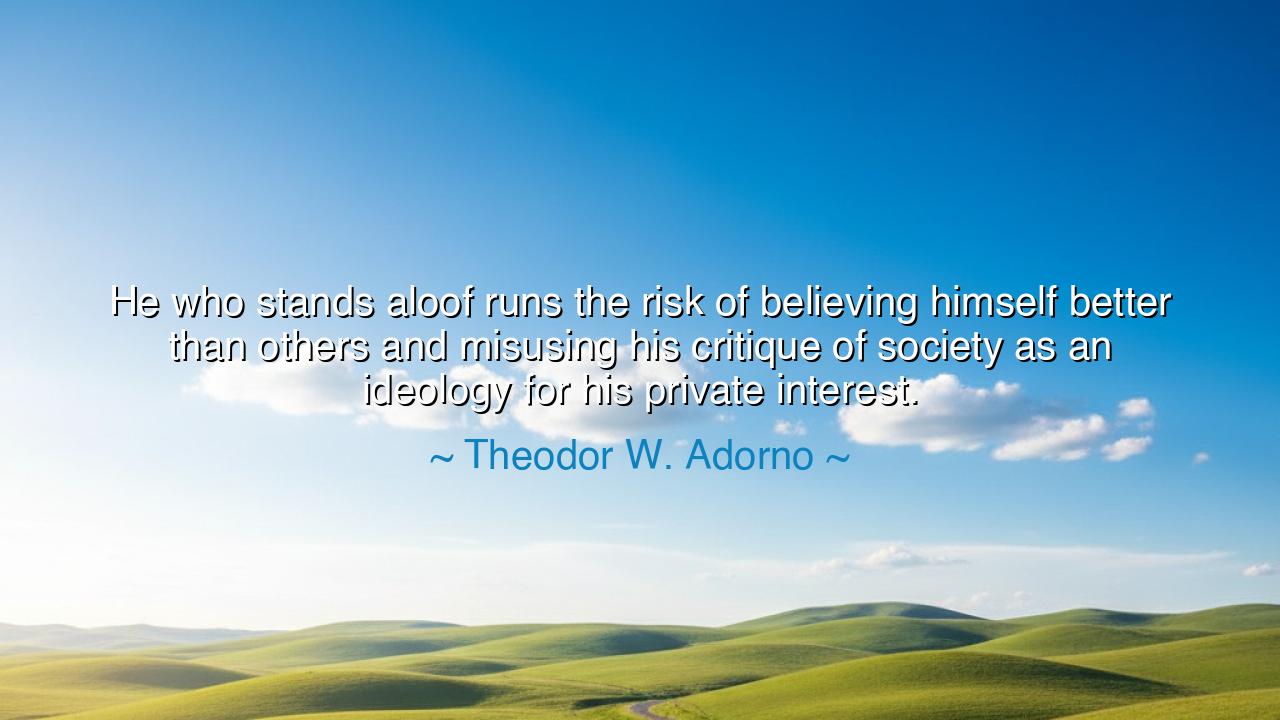
He who stands aloof runs the risk of believing himself better
He who stands aloof runs the risk of believing himself better than others and misusing his critique of society as an ideology for his private interest.






"He who stands aloof runs the risk of believing himself better than others and misusing his critique of society as an ideology for his private interest." These words by Theodor W. Adorno reflect a deeply human truth, one that resonates through history and society. Aloofness, the act of standing apart from society and its struggles, may initially seem like an act of wisdom or critical distance, but Adorno warns that it comes with a dangerous pitfall. To stand outside the fray, to look down upon society from a distance, is to risk believing oneself superior—more enlightened, more righteous, and more capable of understanding the flaws of the world. Aloofness becomes a shield to hide behind, a comfortable distance that keeps one from truly engaging with the struggles and injustices of the world.
In the ancient world, the great philosophers and thinkers often wrestled with the idea of engagement versus detachment. Socrates, for instance, was always in the thick of things, questioning and challenging those around him. He did not distance himself from society’s moral dilemmas but confronted them head-on, seeking to improve both himself and his society. His participation in the social and political life of Athens was not just a philosophical choice; it was a moral imperative. In contrast, the Stoics, led by figures like Epictetus and Marcus Aurelius, believed in a form of detachment, in accepting the world as it was, while still striving to live a virtuous life. Yet even the Stoics, who believed in inner peace and self-control, did not advocate for complete withdrawal from the world—they believed in engaging with it and understanding it from a place of reason.
Adorno’s warning speaks to the danger of becoming disconnected from society, especially for those who view themselves as critics of the world. The outsider, who critiques society from a distance, can easily fall into the trap of believing that their criticism makes them somehow superior to the masses. This mindset leads to ideology, where the critique is no longer a means of social transformation but a tool for personal gain or self-justification. The critique of society, when separated from the lived experiences of those affected, becomes self-serving and unhelpful. The critic, in this case, may see themselves as an enlightened being, but in reality, they are disconnected from the very people and issues they claim to be addressing.
The story of Karl Marx offers a stark example of this tension between engagement and detachment. Marx, though often seen as a detached intellectual, was deeply involved in the struggles of the working class. His critique of capitalism was not an abstract theory but a call to arms, an invitation for people to engage in the world and fight against the exploitation they faced. His theory was not intended for the elite or the intellectuals to feel superior, but rather as a tool for the oppressed to understand and reclaim their dignity. Yet, some of his followers, especially in later generations, misused his ideas, turning them into ideologies that justified repression or authoritarian rule. In these cases, the critique of society became something that separated people from the real struggles of the world, becoming a tool for power rather than liberation.
Adorno’s warning becomes all the more relevant in today’s world, where we see many who claim to critique society but remain disengaged from its deepest problems. Intellectuals, activists, and even artists often critique society from the comfort of their own lives, isolated from the people they claim to represent. This aloofness fosters the belief that the critic’s superiority is inherent, a belief that undermines the true purpose of critique: to engage with society, to transform it, and to bring about change. When critique becomes detached from action, it is misused. The critic becomes an ideologue, and the critique itself becomes a shield, protecting the critic from the very society they are attempting to change.
The lesson here is that critique must always be grounded in engagement. We must be willing to participate in the world we seek to critique, to understand it from the inside, and to act on the values we hold dear. It is easy to stand aloof, to distance oneself from the chaos of the world and point out its flaws from a position of comfort. But true critique is an act of engagement—it is not about showing how much better we are than others but about finding ways to change the world for the better, alongside the people we seek to help. To truly change society, we must live within it, share its struggles, and work together toward a common goal. Only then can our critique have true meaning and lead to real transformation.
In our own lives, let us strive to avoid the trap of aloofness. When we see injustice, inequality, or suffering, let us not simply stand back and offer detached criticism. Let us step into the world, into the messiness of real life, and offer our voices, our ideas, and our actions as part of the solution. Let us understand that critique is not about elevating ourselves above others but about working together to bring about a better world. Only through engagement can we ever hope to make meaningful change, for it is in the hearts and minds of those affected by society’s flaws that true transformation begins.






AAdministratorAdministrator
Welcome, honored guests. Please leave a comment, we will respond soon